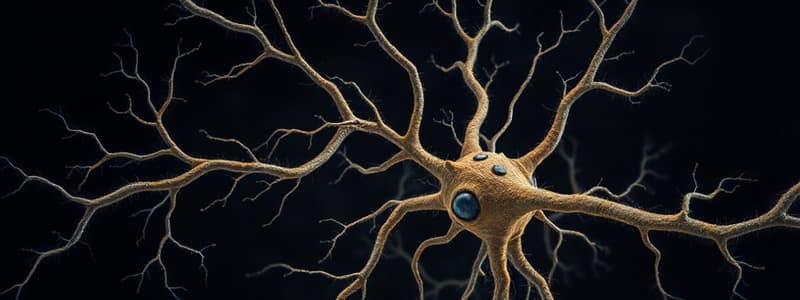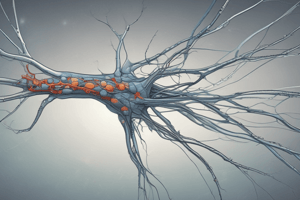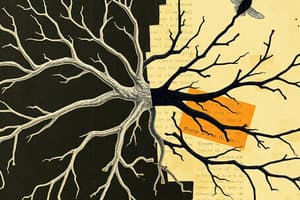Podcast
Questions and Answers
What role do carrier vesicles play in neurotransmitter transport?
What role do carrier vesicles play in neurotransmitter transport?
- They store neurotransmitters until they're needed.
- They facilitate the docking of vesicles at the synapse.
- They transport neurotransmitters across the synaptic cleft.
- They contain membrane transporter proteins moved along microtubules. (correct)
Which neurotransmitter is classified as a monoamine and can be inhibitory or excitatory?
Which neurotransmitter is classified as a monoamine and can be inhibitory or excitatory?
- Dopamine (correct)
- Acetylcholine
- Glutamate
- GABA
What is the function of the hippocampus within the limbic system?
What is the function of the hippocampus within the limbic system?
- Controlling emotional responses to fear
- Regulating sleep and alertness
- Processing auditory signals
- Processing long term memory and spatial navigation (correct)
What is the primary function of dendrites in a neuron?
What is the primary function of dendrites in a neuron?
Which lobe of the cerebrum is primarily responsible for processing visual information?
Which lobe of the cerebrum is primarily responsible for processing visual information?
What structure connects the left and right hemispheres of the brain?
What structure connects the left and right hemispheres of the brain?
What is the role of oligodendrocytes in the central nervous system?
What is the role of oligodendrocytes in the central nervous system?
Which brain structure is involved in regulating emotional responses and is associated with fear?
Which brain structure is involved in regulating emotional responses and is associated with fear?
How does myelin affect nerve conduction speed?
How does myelin affect nerve conduction speed?
Which structure in a neuron is responsible for sending messages as electrical impulses?
Which structure in a neuron is responsible for sending messages as electrical impulses?
What type of neurotransmitter is acetylcholine classified as?
What type of neurotransmitter is acetylcholine classified as?
Which part of the brainstem is responsible for controlling involuntary functions like breathing?
Which part of the brainstem is responsible for controlling involuntary functions like breathing?
The accumulation of voltage-gated sodium channels at the nodes of Ranvier is a result of which process?
The accumulation of voltage-gated sodium channels at the nodes of Ranvier is a result of which process?
What role does the thalamus play in the brain?
What role does the thalamus play in the brain?
What percentage of myelin is comprised of lipid content?
What percentage of myelin is comprised of lipid content?
Defects in myelination and myelin structure can occur due to exposure to which of the following substances?
Defects in myelination and myelin structure can occur due to exposure to which of the following substances?
Which lobe of the cerebrum is involved with language comprehension and memory?
Which lobe of the cerebrum is involved with language comprehension and memory?
Which part of a neuron contains the nucleus and cytoplasm?
Which part of a neuron contains the nucleus and cytoplasm?
What is the primary function of the hypothalamus?
What is the primary function of the hypothalamus?
What is the main role of neuropeptides like orexin in the central nervous system?
What is the main role of neuropeptides like orexin in the central nervous system?
What best describes the function of excitatory neuron 1 in the context of neuronal interaction?
What best describes the function of excitatory neuron 1 in the context of neuronal interaction?
Which area of the cerebrum contains sensory areas for reading and writing?
Which area of the cerebrum contains sensory areas for reading and writing?
What is the primary cause of the dysfunction in multiple sclerosis (MS)?
What is the primary cause of the dysfunction in multiple sclerosis (MS)?
Which type of neuron is characterized by having a single axon and a single dendrite?
Which type of neuron is characterized by having a single axon and a single dendrite?
Which ion channel opens at -55mV and is crucial for initiating an action potential?
Which ion channel opens at -55mV and is crucial for initiating an action potential?
What is the resting membrane potential of a neuron?
What is the resting membrane potential of a neuron?
What role do high-dose corticosteroids play in the treatment of multiple sclerosis?
What role do high-dose corticosteroids play in the treatment of multiple sclerosis?
What is the outcome when sodium channels at the axon hillock are sensitized to -55mV?
What is the outcome when sodium channels at the axon hillock are sensitized to -55mV?
What type of neuron is found predominantly in sensory ganglia of cranial and spinal nerves?
What type of neuron is found predominantly in sensory ganglia of cranial and spinal nerves?
Calcium channels open at the presynaptic terminal during which phase of synaptic transmission?
Calcium channels open at the presynaptic terminal during which phase of synaptic transmission?
Which type of receptor responds to neurotransmitters by indirectly opening ion channels?
Which type of receptor responds to neurotransmitters by indirectly opening ion channels?
What is the role of Na+/K+ transporters in neurons?
What is the role of Na+/K+ transporters in neurons?
What occurs when ligand-gated ion channels open in response to neurotransmitters?
What occurs when ligand-gated ion channels open in response to neurotransmitters?
What is the common feature of multipolar neurons?
What is the common feature of multipolar neurons?
What is the function of SNARE proteins in synaptic transmission?
What is the function of SNARE proteins in synaptic transmission?
During which phase does repolarization occur in an action potential?
During which phase does repolarization occur in an action potential?
What is the role of the lateral nucleus (LA) in the amygdala?
What is the role of the lateral nucleus (LA) in the amygdala?
What type of information do the medial entorhinal cortex (MEC) and lateral entorhinal cortex (LEC) relay to the hippocampus?
What type of information do the medial entorhinal cortex (MEC) and lateral entorhinal cortex (LEC) relay to the hippocampus?
Which drug class is commonly used to treat anxiety disorders by enhancing GABA-mediated synaptic inhibition?
Which drug class is commonly used to treat anxiety disorders by enhancing GABA-mediated synaptic inhibition?
What is a common early symptom of Alzheimer's disease?
What is a common early symptom of Alzheimer's disease?
How does the hypothalamus regulate body temperature?
How does the hypothalamus regulate body temperature?
What vulnerability is associated with the dysfunction of cholinergic neurons in the context of Alzheimer's disease?
What vulnerability is associated with the dysfunction of cholinergic neurons in the context of Alzheimer's disease?
What function does the amygdala primarily serve in relation to emotional responses?
What function does the amygdala primarily serve in relation to emotional responses?
What is the primary role of serotonin in relation to the amygdala?
What is the primary role of serotonin in relation to the amygdala?
What result is generally associated with damage to the hypothalamus?
What result is generally associated with damage to the hypothalamus?
In the context of fear conditioning, what role does the auditory thalamic input have?
In the context of fear conditioning, what role does the auditory thalamic input have?
What characterizes the projection pathways of the hippocampus?
What characterizes the projection pathways of the hippocampus?
What is a symptom of generalized anxiety disorder?
What is a symptom of generalized anxiety disorder?
Which treatment is effective for Alzheimer's disease by blocking the breakdown of acetylcholine?
Which treatment is effective for Alzheimer's disease by blocking the breakdown of acetylcholine?
Flashcards are hidden until you start studying
Study Notes
Neuron Structure
- The basic unit of the nervous system is the neuron (nerve cell)
- Neurons consist of a cell body, dendrites, and an axon
- The cell body contains the nucleus and cytoplasm, responsible for transcription and translation
- Dendrites are branched extensions of the cell body, conducting impulses towards the cell body
- The axon is an elongated extension of the cell body, sending messages as electrical impulses
Neuron Structure - Axon Myelination
- Myelin is a fatty substance that insulates axons, increasing the speed of nerve conduction
- Myelin sheaths are created by oligodendrocytes in the central nervous system
- Myelination results in the accumulation of voltage-gated sodium channels at the nodes of Ranvier
Neuron Structure - Common Structures
- Multipolar neurons have multiple dendrites extending from different regions of the cell body, the most common type of neuron in the CNS
- Bipolar neurons have two processes: one axon and one dendrite, found in sensory organs such as the retina and olfactory epithelium
- Pseudounipolar neurons have two processes that fuse into one short axon, found in sensory ganglia of cranial and spinal nerves
Neuron Function - Synaptic Transmission
- Communication between neurons occurs at synapses
- Synaptic transmission involves the release of neurotransmitters from the presynaptic neuron, which bind to receptors on the postsynaptic neuron
- Ion channels and neurotransmitter receptors control synaptic transmission
- Voltage-gated ion channels directly open ion channels in response to changes in membrane potential
- Ligand-gated ion channels directly open in response to neurotransmitters
- Metabotropic receptors indirectly open ion channels in response to neurotransmitters
Synaptic Transmission: Action Potential Generation
- Resting membrane potential is typically -70mV
- Binding of neurotransmitters to receptors causes changes in ion concentration, resulting in changes in membrane potential
- When the membrane potential reaches -55mV, it triggers the opening of voltage-gated sodium channels
- Depolarization is the process of the membrane potential becoming more positive, while repolarization is the process of the membrane potential returning to its resting value
- Depolarization of the presynaptic terminal opens calcium channels, triggering the release of neurotransmitters
Ion Channels
- Voltage-gated sodium channels open at -55mV and inactivate at +40mV
- Voltage-gated potassium channels open slowly and cause hyperpolarization, returning the membrane potential to its resting value
- The sodium-potassium pump actively transports ions to maintain resting levels
Vesicle Docking and Neurotransmitter Release
- Calcium binds to SNARE proteins, triggering the fusion of vesicles with the presynaptic membrane
- Fusion releases neurotransmitters into the synapse
Neurotransmitters
- Dopamine, norepinephrine, serotonin, and acetylcholine are monoamines
- GABA, glutamate, and glycine are amino acids
- Orexin is a neuropeptide
Neuron Response
- Excitatory neurons activate other neurons, increasing their likelihood of firing
- Inhibitory neurons suppress the activity of other neurons
- Neuronal networks can have complex interactions, with multiple excitatory and inhibitory connections
The Central Nervous System
- The CNS is made up of the brain and spinal cord
Brain Anatomy
- The cerebrum is the largest part of the brain, responsible for higher-level functions such as perception, cognition, and memory
- The brain stem connects the brain to the spinal cord, responsible for regulating basic functions such as breathing and heart rate
- The limbic system is involved in emotional and behavioral responses
Limbic System
- The amygdala is involved in processing fear and other emotions
- The hippocampus is involved in long-term memory and spatial navigation
- The thalamus acts as a relay center for sensory and motor signals
- The hypothalamus coordinates hormonal and behavioral rhythms and homeostatic mechanisms
Brain Stem
- The midbrain is involved in auditory and visual processing, arousal, and consciousness
- The pons carries signals that control basic functions such as sleep
- The medulla controls involuntary functions such as breathing and heart rate
Cerebral Cortex: Neocortex
- The cerebral cortex is the outermost layer of the cerebrum, responsible for higher-level cognitive functions
- The neocortex is made up of six layers, each with different functions
The Amygdala
- The amygdala is a key structure involved in fear conditioning and emotional responses to aversive stimuli
- The central nucleus of the amygdala is the output region of the amygdala
- The lateral nucleus of the amygdala receives sensory input and is involved in fear memory formation
- Dysfunction of the amygdala can lead to anxiety disorders and other emotional disorders
The Hippocampus
- The hippocampus is crucial for memory formation, particularly for spatial navigation
- The entorhinal cortex is the main input and output structure of the hippocampal formation
- The hippocampus contains cholinergic neurons, which are important for normal memory function
- The hippocampus is affected in Alzheimer's disease, leading to memory impairment and cognitive decline
The Thalamus and Brain Stem
- The thalamus plays a vital role in sleep-wake regulation and arousal
- The brain stem connects the brain to the spinal cord and is also involved in regulating sleep and arousal
The Hypothalamus
- The hypothalamus links the nervous system to the endocrine system via the pituitary gland
- The hypothalamus produces and releases neurohormones
- The hypothalamus is involved in regulating temperature, appetite, and sexual behavior
- Dysfunction of the hypothalamus can cause appetite, temperature, and sleep disorders
Summary
- The text provides a comprehensive overview of the structure and function of neurons, the main regions of the brain (including the cerebrum, limbic system, and brain stem), and the role of key neurotransmitters
- The text also discusses the mechanisms of synaptic transmission and the impact of neuronal dysfunction on various brain functions and disorders
Studying That Suits You
Use AI to generate personalized quizzes and flashcards to suit your learning preferences.




